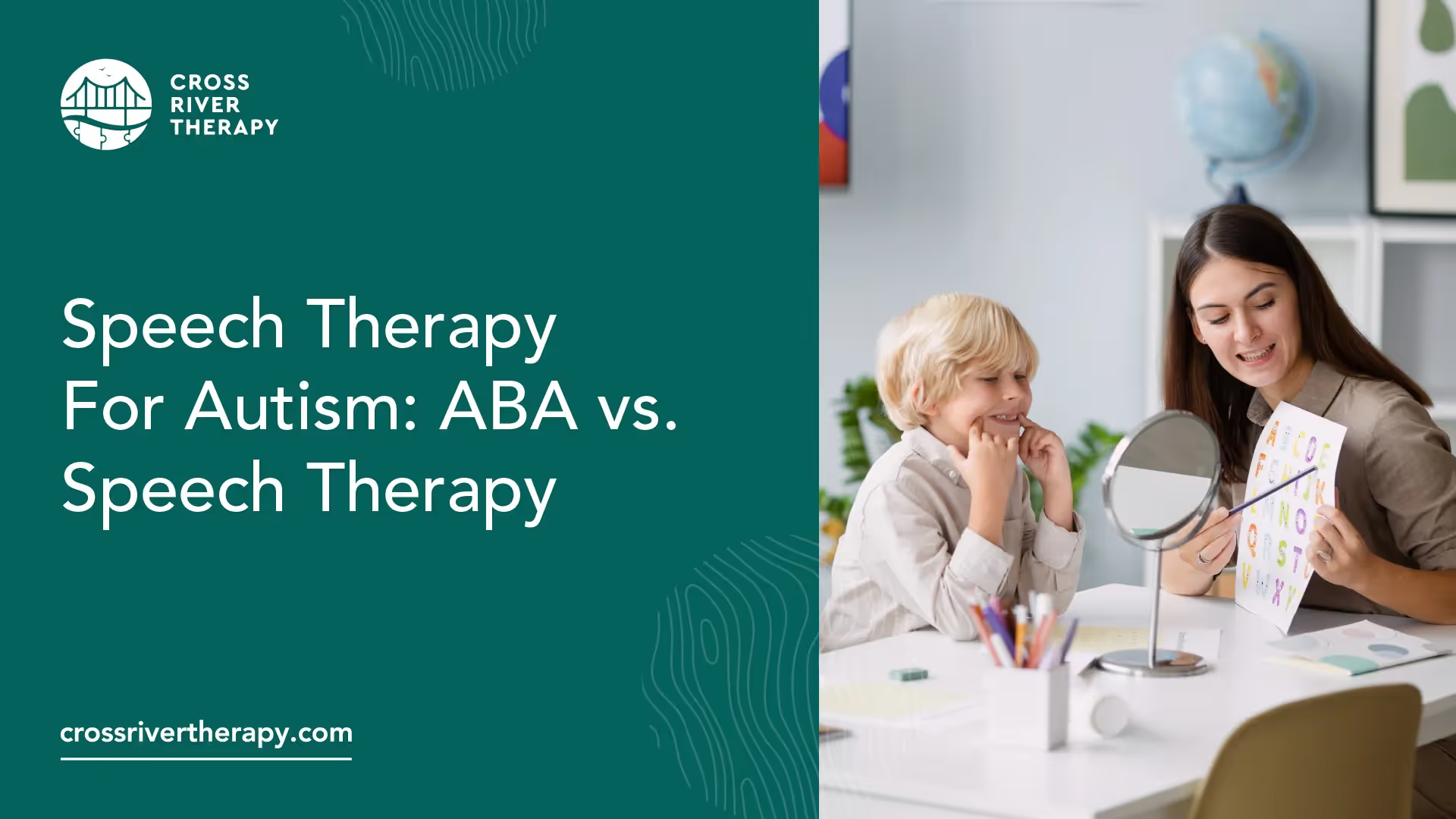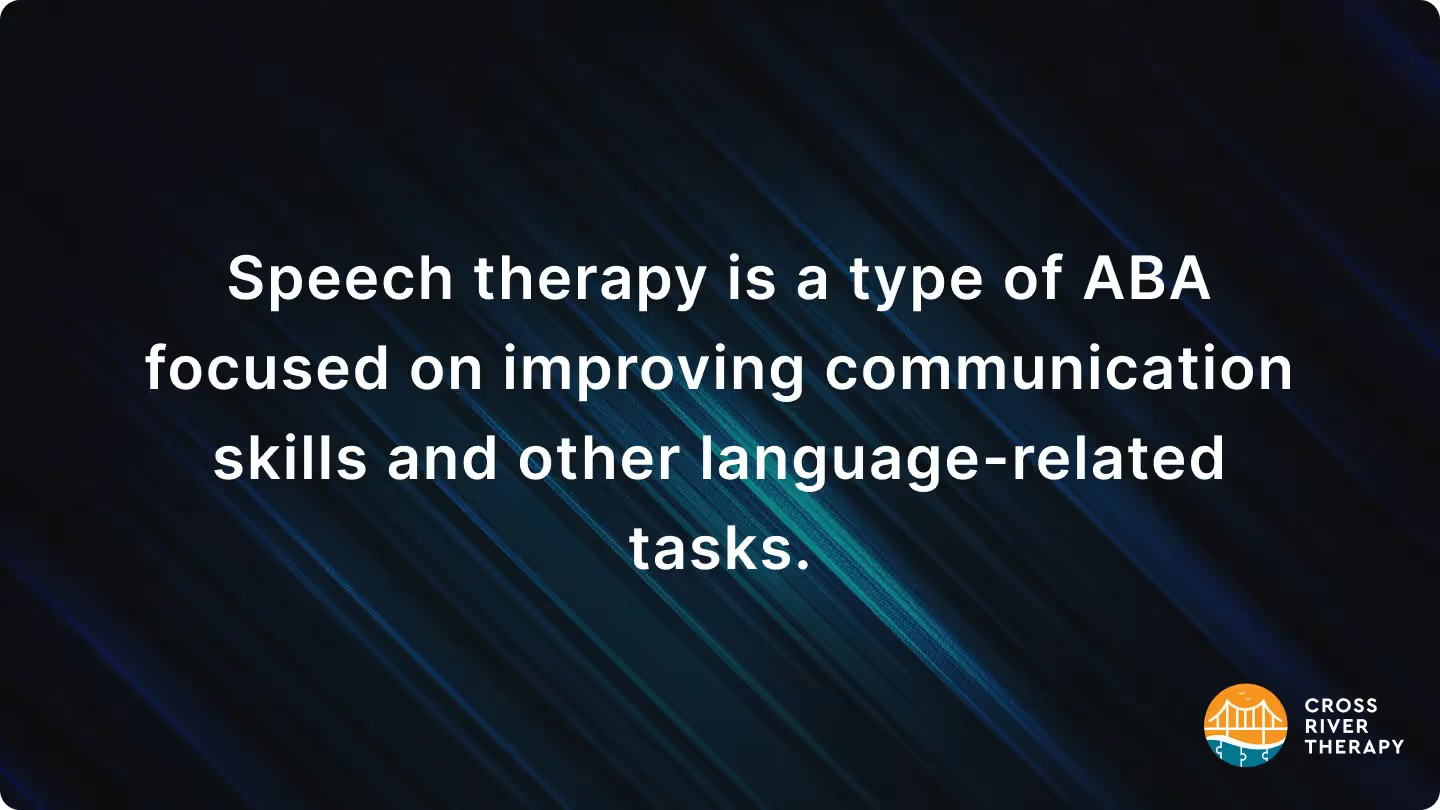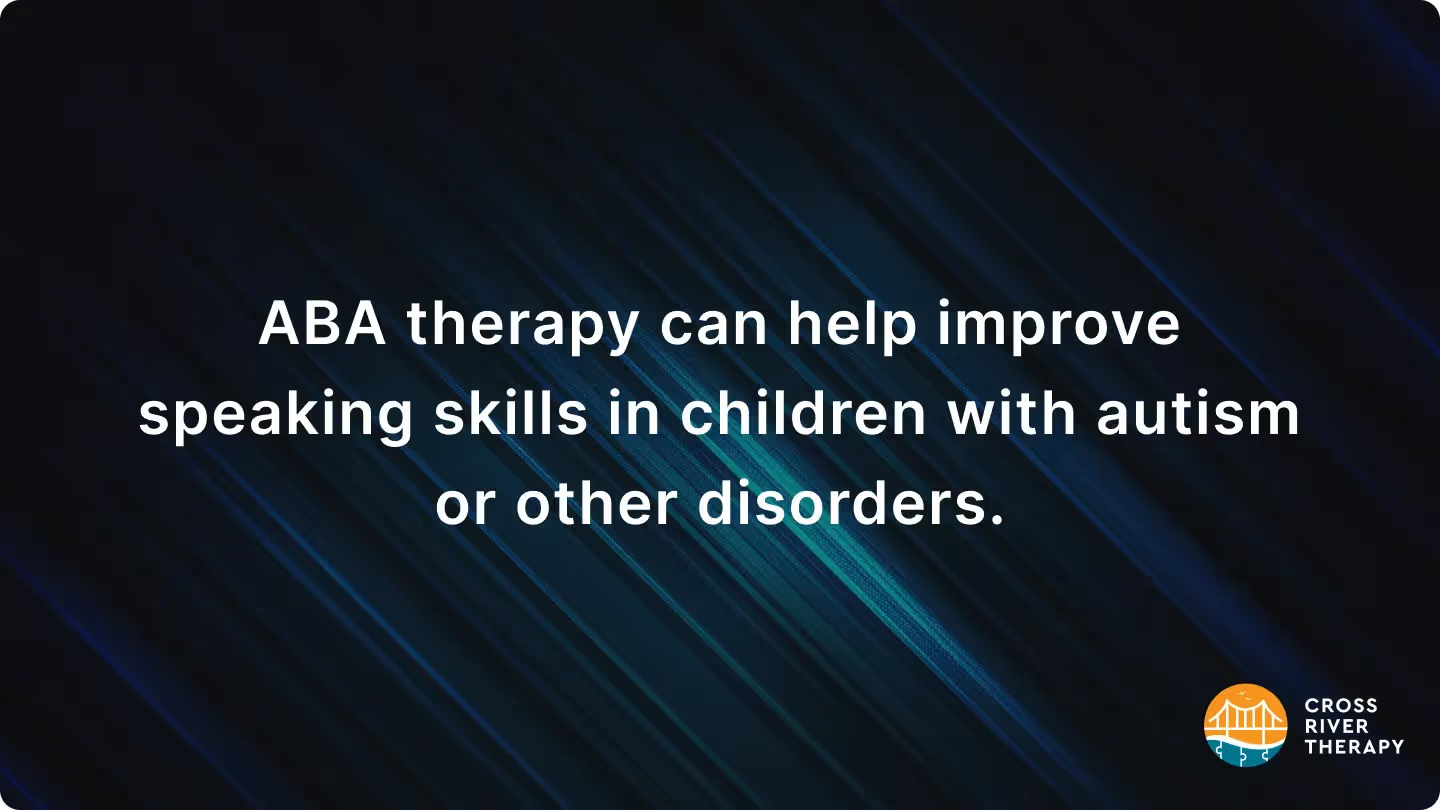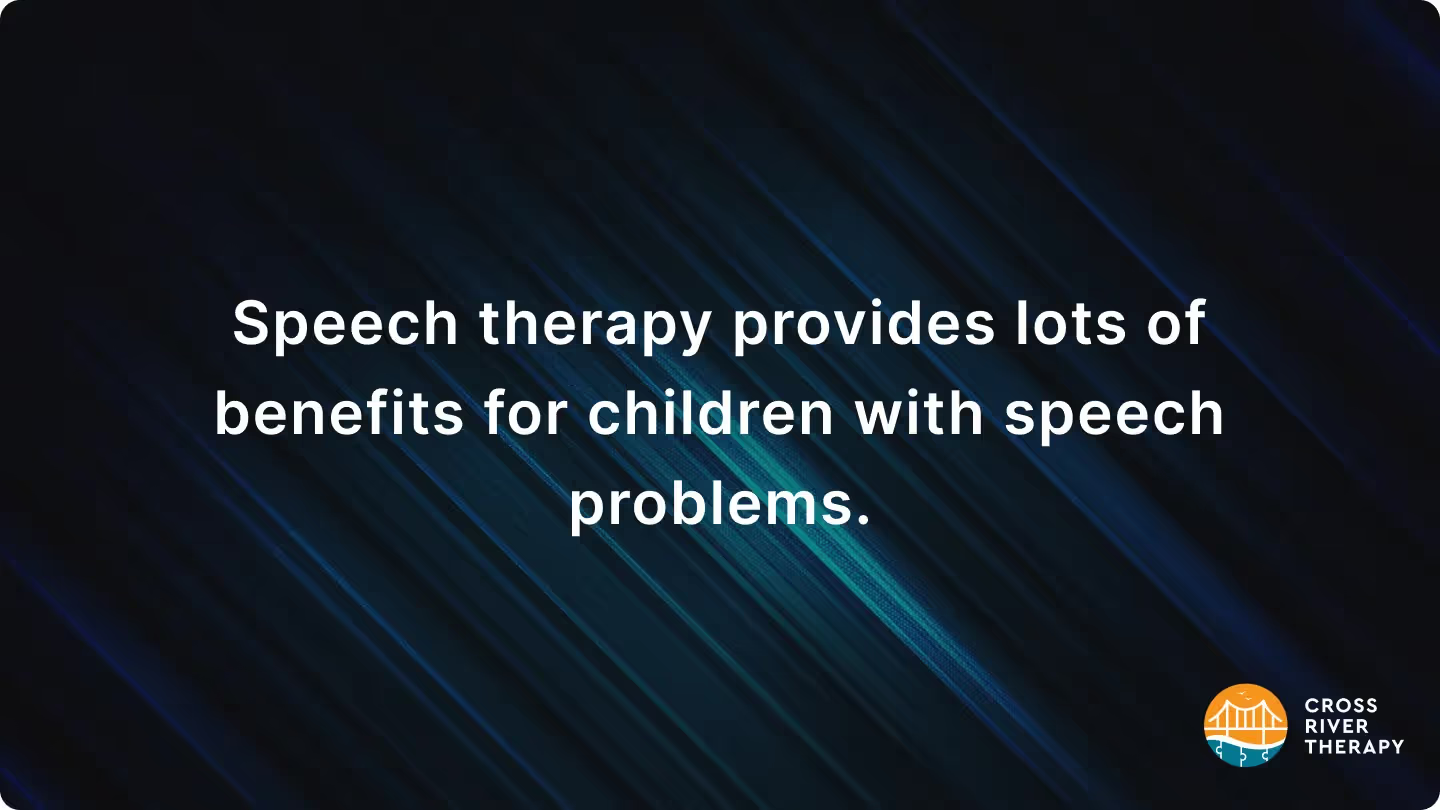Speech Therapy For Autism: ABA vs. Speech Therapy
ABA therapy can help individuals with speech impairments learn to better identify and utilize the language skills they already have.

What Is Speech Therapy For Autism?
Speech therapy for autism is a type of applied behavior analysis (ABA) focused on improving communication skills and other language-related tasks.

It can involve using flashcards, pictures, or other visual aids to teach children the meaning of words and symbols. Speech therapists may also use language drills or games to help children become more comfortable with speaking and expressing themselves. The goal of speech therapy is to support the individual in developing their ability to communicate effectively.
Does ABA Therapy Help With Speech?
Yes, ABA therapy can be very beneficial in helping individuals with autism improve their speech and communication skills. Through careful instruction and repetition, these techniques can help individuals learn how to understand and express language better.

In addition, ABA therapists may also use techniques such as positive reinforcement to motivate individuals and encourage them to further develop their communication skills.
ABA can be especially helpful in teaching basic language skills, such as pronunciation and grammar, as well as more complex concepts like understanding abstract ideas or expressing emotions.
Ultimately, ABA therapy is just one part of a comprehensive treatment plan for individuals with autism that is designed to improve their overall quality of life. The success of any speech therapy intervention depends on the individual’s motivation, dedication, and ability to understand instruction.
It’s important for parents and professionals to work together to create an environment where the individual feels comfortable learning new language skills. With consistent practice and repetition, ABA therapy can yield excellent results in helping individuals with autism develop their communication skills.
Benefits Of Speech Therapy For Autism
Speech therapy for autism can bring about a wide range of positive changes in an individual’s ability to communicate. Improved communication skills can lead to better social interactions and relationships with peers, family members, and others.

Additionally, increased confidence in verbal expression can reduce anxiety and promote self-esteem. Speech therapists may also be able to help individuals develop alternate methods of communication such as sign language or picture boards, which can give the individual more opportunities to express themselves.
Speech therapy through ABA techniques is an important part of helping individuals with autism learn how to communicate effectively. With consistent practice and support from parents and professionals alike, these therapies can make a significant difference in improving an individual’s quality of life.
By using ABA therapy, individuals with autism can begin to build the skills they need to effectively express themselves and develop meaningful relationships.
Through careful instruction, positive reinforcement, and repetition, these therapies can help individuals learn the language skills necessary for success. With dedication and effort, speech therapy through ABA techniques can be effective in helping individuals with autism improve their communication skills.
Is Speech Therapy Covered By Insurance?
In many cases, speech therapy services for autism are covered by health insurance plans. It is important to check with your provider to determine what type of coverage and reimbursement you may be eligible for.
Additionally, some states offer special funding or Medicaid waivers to help cover speech therapy costs. It’s also possible to find scholarships or other financial assistance programs that can help offset the cost of speech therapy services.
By researching your options and taking advantage of available resources, it is possible to make speech therapy more affordable. Speech therapy through ABA techniques can be a valuable tool in helping individuals with autism develop their communication skills.
With consistent practice and support from parents and professionals alike, these therapies can make a significant difference in improving an individual’s quality of life.
By using ABA therapy, individuals with autism can begin to build the skills they need to effectively express themselves and develop meaningful relationships.
Through careful instruction, positive reinforcement, and repetition, these therapies can help individuals learn the language skills necessary for success. With dedication and effort, speech therapy through ABA techniques can be effective in helping individuals with autism improve their communication skills.
Does ABA Therapy Help With Speech?
ABA (Applied Behavioral Analysis) therapy is a type of therapy that focuses on improving social, communication, and learning skills. It has also been used to help people with various speech impairments.
ABA works by breaking down complex behavior into smaller tasks and providing positive reinforcement for each step completed. Through repetition and practice, the individual gradually develops new skills which can be useful in many aspects of life.
In regards to speech issues specifically, ABA therapists work closely with individuals to identify areas where improvement can be made and provide targeted strategies for improvement.
This includes assessing the individual’s current language abilities, developing goals for progress and designing an effective treatment plan.
Depending on the severity of the issue, this may involve using visual supports, verbal prompts and rewards to encourage correct responses. ABA can also be used to help individuals understand the basic building blocks of their language, such as grammar and sentence structure.
Benefits Of ABA Speech Therapy
ABA therapy can help individuals with speech impairments learn to better identify and utilize the language skills they already have. It also provides them with an environment that encourages communication, regardless of their current level of skill.
ABA therapy has been shown to be particularly effective when used in combination with traditional methods such as speech-language pathology, occupational therapy and other types of therapies.
In addition to improving overall communication abilities, research indicates that ABA therapy may also help people improve their cognitive functioning.
This includes helping them become more organized and better able to solve problems.
When used in conjunction with special education classes, this type of therapy can help individuals who struggle academically due to difficulty understanding or using language.
Comparing ABA Therapy vs. Speech Therapy
When considering ABA therapy versus speech therapy, it is important to note that they are both used to help individuals with various communication needs.
However, while traditional speech therapy focuses primarily on the development of language and articulation skills, ABA therapy takes a broader approach by attempting to improve an individual’s overall functioning in many areas.
This includes teaching individuals how to interact socially as well as how to develop and utilize their language skills. Ultimately, whether ABA or speech therapy is chosen depends on the individual’s specific needs and goals.
Both types of therapies can be beneficial for those with speech impairments, so it is important for individuals to work closely with their healthcare professionals to determine which type of treatment would be most effective.
Is Speech Therapy Worth It?
Speech therapy can be beneficial for individuals with various types of speech difficulties, including those caused by developmental delays, physical impairments and learning disabilities.
Through individualized treatment plans and targeted strategies, therapists are able to help their clients develop the skills they need to communicate more effectively.
When used in combination with other therapies such as ABA, speech therapy can be even more effective.
This is because it helps individuals build on their existing language skills and gain confidence in using them in a variety of settings.
In addition to improved communication abilities, research also indicates that speech therapy may help improve an individual’s overall quality of life by increasing social interaction, academic performance and job opportunities.
Ultimately, it is up to the individual and their healthcare professionals to decide if speech therapy is the best option for their specific needs.
Conclusion
Overall, ABA therapy can be an effective way to help those with speech impairments or delays improve their communication skills. Through targeted instruction and positive reinforcement, individuals can learn new language skills which can help them better express themselves in everyday life.
Ultimately, the success of ABA depends on a combination of motivation from the individual and collaboration between all involved parties (e.g., therapists, family members). When these elements are present, ABA has the potential to dramatically improve a person’s ability to communicate effectively.
ABA and Speech Therapy are both valuable treatment options for individuals with a range of communication difficulties. While ABA focuses on improving overall functioning in many areas, Speech Therapy specifically targets language and articulation skills.
Ultimately, it is important to work closely with healthcare professionals to determine which type of therapy would be most beneficial in any given situation. With individualized plans and targeted strategies, both therapies can help individuals improve their communication abilities and reach their goals.
Sources
- https://theplaceforchildrenwithautism.com/autism-blog/aba-speech-therapy
- https://www.autismspeaks.org/speech-therapy-autism
- https://www.healthline.com/health/speech-therapy
- https://www.abatherapistjobs.com/blog/aba-communication-for-nonverbal-children
- https://kidsclubaba.com/aba-therapy-vs-speech-therapy/
- https://blueabatherapy.com/aba/aba-therapy-vs-speech-therapy/
- https://online.regiscollege.edu/blog/aba-and-speech-therapy/



